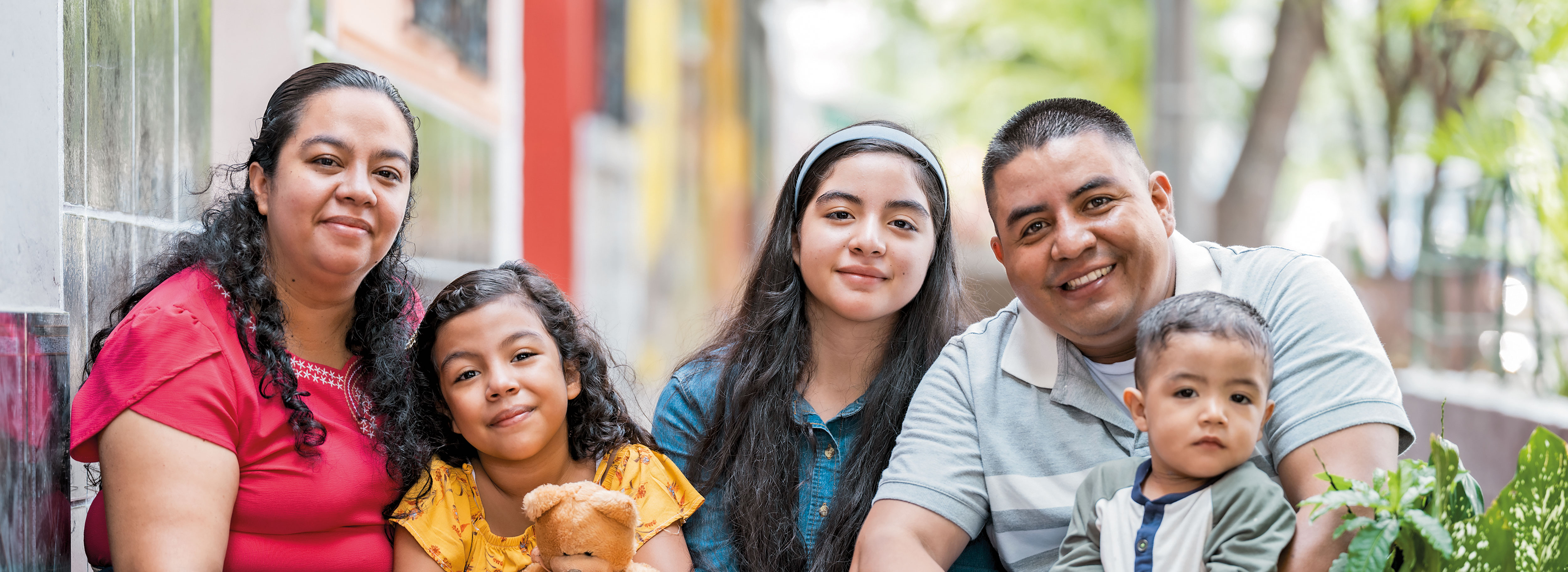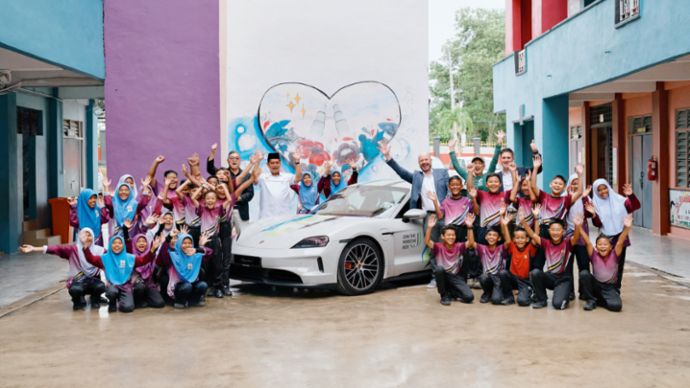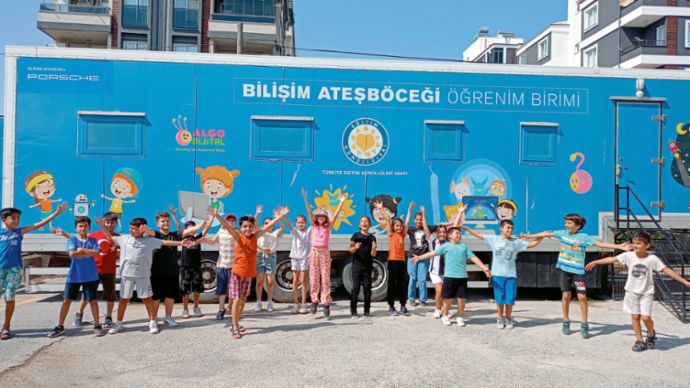Heartbeat
The association Kinderherzen retten e. V. makes futures possible. Specialists in Freiburg im Breisgau operate on children from developing countries who have congenital heart defects. Porsche supports this through its Racing for Charity initiative.
Yamileth Marelin Magaña de Peraza will never forget the moment when her son Abdiel actually stood on his own two feet. For the first 18 months of his life, the boy was weak and sickly. He spent his days in his mother’s arms or sitting in a stroller. He spent most of the time lying down. Then came his first steps. “It was so satisfying!” his mom remembers with unwavering amazement. Just two weeks ago, the child from Santa Ana in El Salvador underwent a heart operation at the University of Freiburg Medical Center. In the operation, what’s known as an atrial septal defect, a hole between the heart’s atria, was closed. This marked the beginning of a new life – both for the little patient and for his family.
Abdiel is one of the now 280 children who have had heart operations in Freiburg im Breisgau, southwest Germany, thanks to the association Kinderherzen retten e. V.
Professor Friedhelm Beyersdorf founded the association in 2002. He had joined the University of Freiburg Medical Center eight years earlier as the youngest professor ordinarius at the time. His mission: to further develop the institution’s heart surgery department and expand it to include a special ward for children, even though he doesn’t himself perform heart operations on children. “It was a highly complex project,” he says, thinking back to the years it took to build up pediatric heart surgery. There is a great deal more effort involved in operating on children’s hearts than, for example, performing a heart bypass on an adult, he explains. The patients are a lot more fragile. “And it’s often the case that children with congenital heart defects have other health issues, too.”
Now 69, Beyersdorf still works as a research professor and continues to campaign for the association he founded. Even being able to attempt to tackle pediatric heart surgery is a privilege, he says, and is impossible in many parts of the world due to a lack of functioning health care systems, infrastructure, technology, and staff. “Elsewhere, children die due to illnesses we can treat relatively easily in Germany thanks to our highly developed system. We are so lucky. I firmly believe that every one of us can and must give something.” The needs are immense: around one percent of all infants are born with a heart defect.

A founder with a passion:
Professor Friedhelm Beyersdorf established the association Kinderherzen retten e. V. at the University of Freiburg Medical Center in 2002. More information at www.kinderherzen-retten.de.The association Kinderherzen retten e. V. is financed solely via donations. And this very much gives the region in the Black Forest purpose – numerous craft businesses, SMEs, and major enterprises get involved. A baker regularly sells doughnuts for the good cause. Europa-Park in Rust, one of the top 20 most visited theme parks in the world, acts as patron. “With us, people can see exactly what their donations are spent on, how we use them, and what effect they have,” explains Professor Beyersdorf. “We’re not an anonymous recipient.” And every contribution helps, no matter how big or small, he says.
“It comes down to the chances of success. The aim is to discharge the children in a healthy condition.”
Professor Friedhelm Beyersdorf
Since 2023, Porsche has been an important supporter, too. The project Racing for Charity was launched as part of the celebrations to mark 75 years of Porsche sports cars as well as the centenary of the 24 Hours of Le Mans. The sports car manufacturer competed in the prototype class with three Porsche 963 cars and donated 750 euros for every lap completed by the hypercars. The amount accrued was then bumped up to 911,000 euros and was distributed to three charitable organizations. 350,000 euros went to Kinderherzen retten. While not marking any anniversary in 2024, Porsche remains on board this year and is sending the three Porsche 963 to Le Mans once again to chase down donations.

Racing for Charity:
The donations drive was launched in 2023 to mark the centenary of the 24 Hours of Le Mans. This year, the Porsche works team will once again be making the 963 an affair of the heart.
Let’s go:
Abdiel has a new lease on life since the successful correction of his heart defect.Abdiel is a prime example of what the surgery can mean to the children. “We’re still amazed at how much his life has improved,” says his mom. Before the operation Abdiel was weak, barely ate, and suffered from anemia, she explains. “After surgery, I saw some incredible changes in him in a matter of hours: before, his breathing was shallow and fast, and he had a high pulse. But his breathing was back to normal soon after the operation.”
The association tackles immense challenges to achieve such successes. One of these challenges is choosing suitable patients. “It comes down to feasibility and the chances of success,” explains Professor Beyersdorf. The aim is to discharge the children in a healthy condition without their needing complementary therapy back at home.” This rules out heart transplants, for example. During the selection process, the team in Freiburg also has to rely on the diagnoses of colleagues in faraway countries. Over the years, an international network of pediatricians and cardiologists has evolved for the mediation of suitable cases. This focuses on Latin America, Southeast Asia, and Afghanistan.
Host families have to be found in Germany. Visas, flights, and drivers need to be arranged. Medical staff are needed – an operating team, pediatric cardiology experts, pediatric heart anesthetists, targeted cardiovascular perfusion in a specially equipped operating theater, as well as a dedicated ICU together with nursing staff. Not forgetting physiotherapy and aftercare. “We are fortunate in Freiburg to have an exceptionally qualified team to hand, with the pediatric heart surgeon Professor Johannes Kroll and the pediatric cardiologist Professor Brigitte Stiller,” says Beyersdorf. The five-figure sum that the association has to raise for each child almost seems small considering the effort involved. For Beyersdorf though, the reward for these efforts is unbelievably big in contrast: a new life for the children. “They come here so weak,” he says. “Then we operate and they recover incredibly quickly. It’s fantastic to see.”

Emotional reward:
A new life starts for the little patients after their successful surgery. And for their families, too.Abdiel and his mom have been back in El Salvador since October 2023. A huge party was held to mark their return. The little boy now lives a perfectly normal life, with the heart defect now just a distant memory. What remains is a great deal of gratitude, and Abdiel’s mom emphasizes: “We will always remind our son that there are wonderful people in the world who help others without even knowing them or expecting anything in return.”
Consumption data
Taycan 4S
Taycan GTS (2023)
-
23.3 – 20.4 kWh/100 km
-
0 g/km
-
A Class
-
A Class




